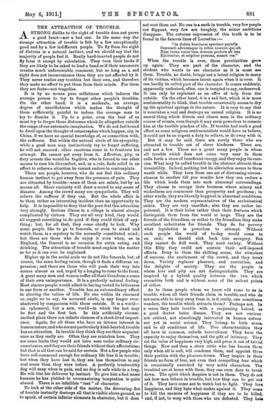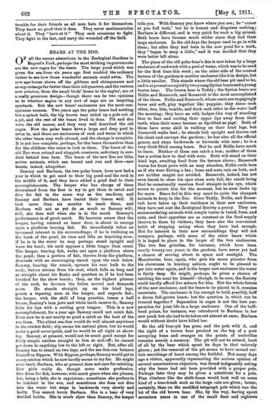THE ATTRACTION OF TROUBLE.
ASTRONG dislike to the sight of trouble does not prove a good heart—nor a bad one. In the same way the strange attraction of trouble is felt by a few exceptionally good and by a few indifferent people. To fly from the sight of distress is a natural instinct, and we should say that the majority of people feel it. Really hard-hearted people do not fly from it except by calculation. They turn their backs if they are likely to be asked to lend a hand or if their unconcern creates much unfavourable comment, but so long as a sad sight does not inconvenience them they are not affected by it. They never realise any troubles but their own, and therefore they make no effort to put them from their minds. For them they are facts—not tragedies.
It is by no means pure selfishness which induces the average person to try to forget other people's troubles. On the other hand, it is a moderate, an average, degree of unselfishness which makes the thought of them sufficiently painful to induce the average man to try to dismiss it. Up to a point, even the best of us must try to forget those distresses which lie altogether outside the range of our automatic imagination. We do not feel bound to dwell upon the thought of catastrophes which happen, say, in China, if we have no special knowledge of, or connection with, the sufferers. But within the natural circle of his sympathy, while a good man may instinctively try to forget suffering, he will not succeed : other emotions come in to frustrate his attempt. He cannot get away from it. Affection, pity, or duty arrests the would-be fugitive, who is forced to use other means to ease his discomfort, and, as a rule, finds relief in an effort to relieve a situation he cannot endure to contemplate.
There are people, however, who do not feel this ordinary human instinct to get away from the presence of pain. They are attracted by trouble—some of them are saints, but by no means all. Sheer curiosity will draw a crowd to any scene of disaster. Among the crowd many are sympathetic. They will relieve the sufferer if they can. But the whole affair is to them rather an interesting incident than an opportunity to help. It is impossible to deny that the poor feel this attraction very strongly. Serious illness in a village is almost always complicated by visitors. They are all very kind, they would all suggest something to do good if they could think of any- thing ; but, for all that, they come chiefly to look. Why some people like to go to funerals, or even to stand and watch them, is a mystery to the normally constituted mind ; but there are those who do enjoy it even when, as in England, the funeral is no occasion for extra eating and drinking. The attraction of trouble must explain the matter so far as it can ever be explained.
Higher up in the social scale we do not like funerals, but, of course, the same feeling exists, though it finds a different ex- pression ; and there are those who will push their way into scenes almost as sad, urged by a longing to come to the front. A great many men and women suffer all their lives from a sense of their own unimportance. It is a perfectly natural feeling. Most sincere people would admit to having tasted its bitterness in one form or another. Trouble has an extraordinary effect in altering the values of life. No one within its charmed or, ought we to say, its accursed circle, is any longer over- shadowed by comparison with those outside. It is a world— an ephemeral, but a new, world—in which the last may be first and the first last. In this artificially circum- scribed place there are infinite chances of a short-lived import- ance. Again, for all those who have an intense interest in human nature, and who are not particularly kind-hearted, trouble has an attraction. In trouble they think they see their acquaint- ance as they really are. Often they are mistaken here. They see some traits they would not have seen under ordinary cir- cumstances, and they see their friends without their affectations; but that is all that can be said for certain. Not a few people who have self-command enough for ordinary life lose it in trouble ; but when they have lost it, they are less themselves in any real sense than they were before. A perfectly trustworthy dog will snap when in pain, and no dog is safe while in a trap. He will bite his deliverer by instinct. To give him a bad name because he has yielded to overmastering temptation is quite absurd. There is no infallible " test " of character.
To look at the other side of the matter, the devouring fire of trouble instantly destroys all that is visible above ground, so to speak, of certain inferior elements in character, but it does not root them out. No one is a snob in trouble, very few people are flippant, very few are haughty, the minor ambitions disappear. The extreme expression of this truth is to be found in the famous lines of Lucretius :—
" in dubiis hominem spectaro pencils Convenit adversisque in rebus noscere qui sit. Nam verae votes turn demum pectore ab imo Ejiciuntur, et eripitur persona, manet res."
When the trouble is over, these peculiarities grow up again. They are part of the character, and the student who wants to see character as it is must see them. Trouble, no doubt, brings out a latent religion in many of its victims, which becomes latent again when it is over. It can hardly be called part of the character. It comes suddenly, apparently undesired, often, one is tempted to say, undeserved.
It can only be explained as an offer of help from the outside. On the other hand, it is a sad fact, which it is mere sentimentality to blink, that trouble occasionally seems to dry up the spiritual springs in the nature. It is easy to say that it nourishes a real and destroys an unreal religion. It is no unreal thing which directs and cheers man in the ordinary course of events, even though it may seem powerless to console him at the terrible pinches of life. If trouble had such a good effect as some religious sentimentalists would have us believe, it could not be so urgent a duty to relieve, or do away with it. But it may be said there are surely those who are attracted to trouble out of sheer kindness. There are, and not a few. There are a great many people in whom all trouble which does not come very near to them calls forth a store of beneficent energy, and they enjoy its exer- cise. What may be called trouble in the abstract attracts them irresistibly. Indeed, nothing but its alleviation seems to them worth while. They turn from one set of distressing circum- stances to another till you wonder how they can endure a life which leads them into such abnormal surroundings.
They choose to occupy their business where misery and wickedness are commoner than prosperity and goodness ; in other words, they are literally happiest in abnormal conditions.
They are the modern representatives of the ecclesiastical saints. They are very unselfish ; also they are rather im- personal. It is their halos rather than their features which distinguish them from the world at large. They are the friends of the friendless, or rather to the friendless they make excellent substitutes for friends. They do for poverty what legislation is powerless to attempt. Without such people the world of to-day would come to an end; we should sink back into savagery. But they cannot do dull work. They need variety. Without this fillip they could not sustain their self-imposed efforts. Deny to them the shifting scene, the stimulant of success, the excitement of the crowd, and they break down. Variety replaces pleasure, and recreation, and the delights of society. They are the people in whom love and pity are not distinguishable. They are inspired by a hybrid quality between the two which resembles both and is without some of the salient points of either.
As to those people whom we know will come to us in trouble, whom all their friends claim in trouble, and who do not seem able to keep away from it, is it really, one sometimes wonders, the trouble which attracts them ? Perhaps not. In a sense they hate trouble with a surpassing hatred, as a good doctor hates disease. They are not curious not critical, not absorbingly interested in human nature nor yet in social science. They belong to both sexes. and to all conditions of life. Two characteristics they all have in common, outside benevolence. They have the capacity to enjoy themselves, and the gift of intimacy. They set the value of happiness very high, and press it out of trivial things. Now and then a stern critic who has known them only when all is well, will condemn them, and appoint them their portion with the pleasure-lovers. They inspire in their friends no form of fear, not even that compelling fear which is occasionally exercised by very noble characters. The troubled are at home with them, they can even dare to break down. The spirit which despises is not in them. They do not
ask how men behave in trouble, but how they can be got out of it. They have come not to watch but to fight. They love happiness, and they hate what makes against it. They come to kill the enemies of happiness if they are to be killed, and, if not, to weep with those who are defeated. They hate
trouble for their friends as all men hate it for themselves. They know no good that it does. They never sentimentalise about it. They "have at it." They seek occasions to fight. They fight to the last, and carry the wounded off the field.











































 Previous page
Previous page